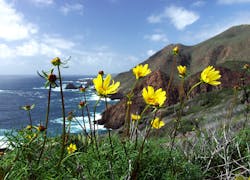EPA awards $280,000 to advance environmental projects in the California/Baja California border region
SAN DIEGO,CA, MARCH 24, 2020 -- The U.S. Environmental Protection Agency (EPA) has announced that it will award nearly $280,000 to four environmental projects benefitting the U.S.-Mexico border region between California and Baja California. With matching funds, the total benefit to the projects will total over half a million dollars.
“Protecting the public health of our border communities with Mexico is a top priority of EPA,” said EPA Administrator Andrew Wheeler. “Through these grants and matching funds, we will be able to better provide a safe and healthy work environment for the community and our federal partners as we monitor changes in air and water quality, make necessary corrections, and prevent these issues from continuing.”
The awards are given through the agency’s Border 2020: U.S.-Mexico Environmental Program and will be matched by an additional $238,000 from the recipient organizations to fund projects to increase air quality monitoring, reduce emissions from mobile sources such as trucks, enhance chemical emergency preparedness and response thru trainings, and develop innovative monitoring tools to address marine litter.
“The mission of Border 2020 is to protect public health and the environment in the U.S.-Mexico border region,” said EPA’s Assistant Administrator for International and Tribal Affairs and the U.S. Border 2020 National Coordinator Chad McIntosh. “These projects will further the work that has led to significant environmental and health improvements in our border communities.”
“Addressing the complex environmental issues we face along the border is a priority we share with our colleagues in Mexico,” said EPA Pacific Southwest Regional Administrator John Busterud. “These projects will benefit communities on both sides of our shared border.”
The non-profit Redspira and Imperial County Air Pollution Control District will expand their binational air monitoring network, which makes information available to the public in real-time, by 30 additional particulate matter regulatory monitors and low-cost sensors in the Imperial-Mexicali air basin. The project will also add 30 schools to the air quality flag program in the Mexicali Valley.
University of California - Berkeley, in collaboration with partners in Mexico, will develop an environmental justice indicator tool, similar to the state of California’s CalEnviroScreen, to calculate exposures to air pollution from transportation in Mexicali. Findings will identify where electrification of city buses would reduce emissions and improve air quality for sensitive populations in the Calexico-Mexicali region.
Arizona State University and Instituto Tecnológico de Mexicali will implement joint binational emergency preparedness and response trainings in the Calexico-Mexicali region, including tabletop exercises enhanced by simulated activation of the existing facility emergency response plans. Partners will include industry, academia, first responders and emergency management departments, reaching over 150 specialists.
4 Walls International and University of California - Irvine will survey trash in the Tijuana River Watershed by taking and analyzing aerial images. The surveys will be used to develop a monitoring tool to estimate the benefits of trash interventions in Tijuana before the garbage reaches the U.S.
These funds were awarded in partnership with the North American Development Bank under the Border 2020: U.S.-Mexico Environmental Program, a binational effort to protect human health and the environment in the U.S.-Mexico border region.
For more information on the Border 2020 Program, visit: www.epa.gov/border2020.
